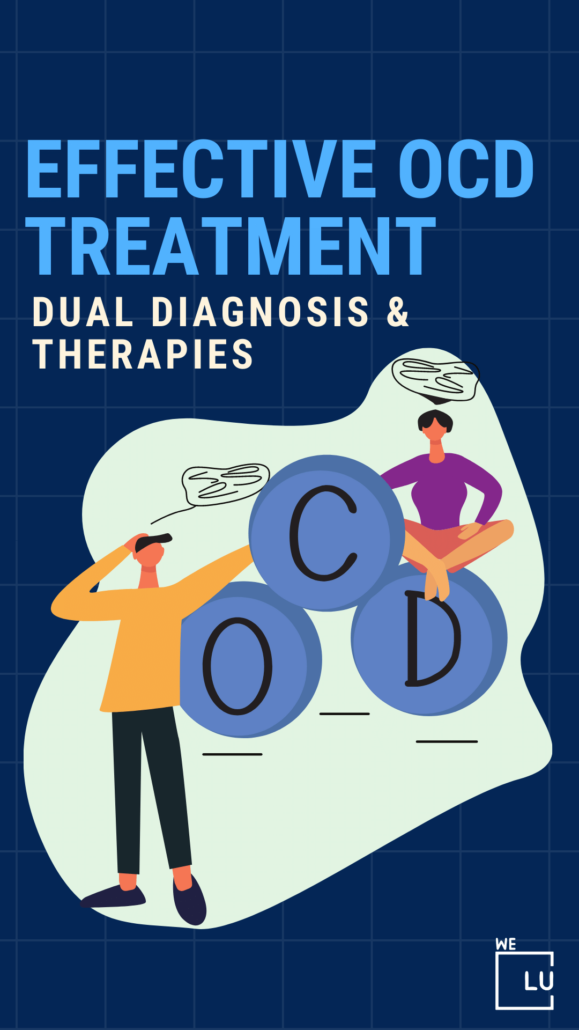OCD Medication
Living with Obsessive-Compulsive Disorder (OCD) can be challenging, marked by persistent intrusive thoughts and the need to engage in repetitive behaviors to alleviate anxiety. While therapy and lifestyle changes are vital to managing OCD, medication can also be crucial in treatment.
This article delves into OCD medication, shedding light on potential side effects that individuals might encounter. Additionally, we will navigate the landscape of finding the best medication options specifically tailored to address the complex interplay of OCD, intrusive thoughts, and anxiety. By understanding the nuances of medication and its effects, individuals and their healthcare providers can make informed decisions to embark on a path toward improved well-being and relief from the grip of OCD.
At We Level Up Treatment Center, we offer comprehensive and compassionate OCD medication treatment options designed to relieve the distressing symptoms of Obsessive-Compulsive Disorder effectively.
Side Effects of Medication for OCD
OCD medication, like any other medication, can have potential side effects. These OCD medication side effects can vary based on the specific medication type, the individual’s unique response to the medication, and the dosage prescribed. It’s important to note that not everyone will experience these side effects, and some individuals may experience only mild or temporary effects. Here are some common side effects associated with OCD medication:
- Nausea and Upset Stomach: Many medications can cause gastrointestinal discomfort, leading to symptoms like nausea, vomiting, or an upset stomach.
- Drowsiness or Fatigue: Some OCD medications, particularly those that affect serotonin levels, can lead to feelings of drowsiness or excessive tiredness.
- Insomnia or Sleep Disturbances: Certain medications might cause difficulty falling asleep or maintaining a restful sleep pattern.
- Dry Mouth: A common side effect, particularly with medications that influence neurotransmitters, is a dry sensation in the mouth.
- Headache: Headaches can occur as the body adjusts to the medication. They are usually temporary but can be uncomfortable.
- Dizziness or Lightheadedness: Feeling dizzy or lightheaded might occur significantly when changing positions quickly.
- Sexual Dysfunction: Some OCD medications, particularly selective serotonin reuptake inhibitors (SSRIs), can affect sexual desire, arousal, and performance.
- Weight Changes: Certain medications might lead to weight gain or loss, which can be distressing for some individuals.
- Agitation or Restlessness: In some cases, OCD medications can cause feelings of restlessness or agitation.
- Sweating: Increased sweating, particularly night sweats, can be a side effect for some individuals.
- Tremors or Shakiness: Some people may experience tremors or shakiness in their hands or other body parts.
- Changes in Blood Pressure: Certain medications might lead to fluctuations in blood pressure, which can have various effects.
- Digestive Issues: Apart from nausea, some individuals might experience constipation, diarrhea, or other digestive issues.
- Allergic Reactions: While rare, allergic reactions can occur with any medication, leading to symptoms such as rash, itching, swelling, or difficulty breathing.
- Mood Changes: In some cases, OCD medications can influence mood, potentially causing increased anxiety, irritability, or other emotional changes.
Discussing any side effects with a healthcare provider is crucial, as they can help determine whether the side effects are temporarily manageable or if adjustments to the medication regimen are needed. Sometimes, side effects diminish as the body becomes accustomed to the medication. Healthcare providers can also help weigh the benefits of the medication against its potential side effects and make necessary adjustments to ensure the best possible treatment outcome.


Skip To:
Learn More:
OCD Medical Abbreviation
The medical abbreviation “OCD” stands for “Obsessive-Compulsive Disorder.” It is a mental health condition characterized by two main components: obsessions and compulsions.
- Obsessions: These are intrusive, unwanted, and distressing thoughts, images, or urges that repeatedly enter a person’s mind. These thoughts are often irrational and cause significant anxiety or discomfort.
- Compulsions are repetitive behaviors or mental acts that an individual feels driven to perform in response to the obsessions or according to specific rules. These compulsions aim to reduce the distress caused by the obsessions or to prevent a feared event or situation.
Combining obsessions and compulsions can significantly interfere with a person’s daily life, relationships, and overall functioning. While everyone may experience obsessive thoughts or engage in repetitive behaviors from time to time, OCD is diagnosed when these symptoms become extreme, time-consuming, and impairing.
OCD is classified as an anxiety disorder, and its exact cause is not fully understood. However, a combination of genetic, neurological, behavioral, cognitive, and environmental factors is believed to contribute to the development of the disorder.
Get Help. Get Better. Get Your Life Back.
Searching for Accredited Dual Diagnosis Mental Health Centers Near You?
Even if therapy failed previously, or are in the middle of a difficult crisis, we stand ready to support you. Our trusted behavioral health specialists will not give up on you. When you feel ready or just want someone to speak to about counseling alternatives to change your life call us. Even if we cannot assist you, we will lead you to wherever you can get support. There is no obligation. Call our hotline today.
FREE 24/7 Dual Diagnosis Mental Health Services HotlineOCD Fact Sheet
OCD Overview
Obsessions with excessive ideas trigger recurrent behaviors (compulsions). Unreasonable worries and obsessions (compulsive behaviors) are hallmarks of obsessive-compulsive disorder.
OCD frequently centers on ideas like a dread of germs or the requirement to organize objects in a certain way. Symptoms typically appear gradually and change over time. Both conversation therapy and medication are used as treatments.
OCD Symptoms
Behavioral: compulsive behavior, agitation, compulsive hoarding, hypervigilance, impulsivity, meaningless repetition of own words, repetitive movements, ritualistic behavior, social isolation, or persistent repetition of words or actions.
Mood: Anxiety, apprehension, guilt, or panic attack.
Whole body: fatigue or sweating.
Also standard are food aversion, nightmares, or rumination.
Types of OCD Disorders
- Contamination OCD.
- Checking OCD.
- Harm OCD.
- Hoarding OCD.
- Pure-O (Purely Obsessional) OCD.
- Symmetry and Ordering OCD.
- Sexual Orientation OCD.
- Relationship OCD.
- Religious OCD (Scrupulosity).
- Health Anxiety OCD.
OCD Medication Statistics
In this article, we delve into OCD medication statistics to shed light on the prevalence of medication usage, trends in prescription practices, and the broader impact of these medications on those living with OCD. By examining these statistics, we aim to gain a deeper understanding of medication’s role in the comprehensive management of OCD.
- Prevalence of Medication Usage: According to recent studies, approximately 60% to 70% of individuals diagnosed with OCD receive medication as part of their treatment plan. This underscores medication’s significant role in the multifaceted approach to managing OCD.
- Primary Medication Class – SSRIs: Selective Serotonin Reuptake Inhibitors (SSRIs) are the most commonly prescribed class of medications for OCD. Statistics reveal that around 50% to 60% of OCD patients are prescribed SSRIs as a first-line pharmacological intervention.
- Effectiveness of Medication in Combination with Therapy: Research indicates that combining medication and cognitive-behavioral therapy (CBT) yields the most effective results in treating OCD. Studies show that up to 70% of individuals experience noticeable improvements when medication and therapy are employed.
- Dosage Adjustments: It is not uncommon for healthcare providers to adjust medication dosages to achieve optimal therapeutic effects. Statistics indicate that around 30% of patients may undergo dosage modifications during their treatment.
2.5 million
OCD affects 2.5 million adults or 1.2% of the U.S. population.
Source: National Institute on Mental Health
25%
The average age of onset is 19, with 25% of cases occurring by age 14. One-third of affected adults first experienced symptoms in childhood.
Source: ADAA
3x
Women are 3x more likely to be affected than men.
Source: ADAA
Risks of OCD Medications
While OCD medications can effectively reduce the symptoms of Obsessive-Compulsive Disorder (OCD), like any medication, they also come with potential risks and side effects. It’s important to comprehensively understand these risks before starting any medication. Here are some potential risks associated with OCD medications:
- Side Effects: Nausea, drowsiness, dry mouth, dizziness, and more.
- Aggravation of Symptoms: Initial worsening of OCD before improvement.
- Sexual Dysfunction: Impact on sexual desire and performance.
- Emotional Changes: Mood swings and increased anxiety.
- Withdrawal Symptoms: Discontinuation can lead to withdrawal effects.
- Interaction with Other Medications: Possible harmful interactions.
- Risk of Suicidality: Slight increase in risk, especially at the start.
- Allergic Reactions: Rare but possible allergic responses.
- Long-Term Effects: Potential effects on health over time.
- Individual Variation: Different responses for each person.

It’s vital to discuss these potential risks with a qualified healthcare provider before starting OCD medication. They can help you make an informed decision, monitor your progress, and manage any possible side effects. In many cases, the benefits of medication in alleviating OCD symptoms outweigh the potential risks, but it’s essential to approach treatment with awareness and caution.

End the Emotional Pain. Get Your Life Back.
Feeling Depressed, Anxious or Struggling with Mental Health Illness? Get Safe Comfortable Mental Health Dual Diagnosis High-Quality Therapy From Counselors That Care. Begin Your Recovery Now.
Hotline (855) 940-6125Medications for OCD
Here is a list of common medications used for Obsessive-Compulsive Disorder (OCD):
OCD Medication List:
| Medication Type | Examples |
|---|---|
| SSRIs | Fluoxetine (Prozac), Sertraline (Zoloft), Paroxetine (Paxil), and more |
| SNRIs | Venlafaxine (Effexor), Duloxetine (Cymbalta) |
| Tricyclic Antidepressants | Clomipramine (Anafranil) |
| Atypical Antidepressants | Bupropion (Wellbutrin) |
| Antipsychotic Medications | Aripiprazole (Abilify), Risperidone (Risperdal), Quetiapine (Seroquel) |
| Anti-Anxiety Medications | Benzodiazepines (e.g., Clonazepam, Lorazepam) |
| Augmentation Agents | Lamotrigine (Lamictal), Buspirone (Buspar) |
| Experimental and Off-Label Medications | N-acetylcysteine, Memantine |
It’s essential to note that medication choices should be made in consultation with a qualified healthcare provider. These medications’ effectiveness and side effects can vary from person to person, so a healthcare professional will help determine the most suitable treatment plan based on an individual’s medical history, symptoms, and potential interactions with other medications.
First-class Facilities & Amenities
World-class High-Quality Mental Health Services & Behavioral Health Substance Abuse Treatment
Rehab Centers TourRenowned Mental Health Centers. Serene Private Facilities. Inpatient Rehab Programs Vary.
Mental Health Helpline (855) 940-6125Proven recovery success experience, backed by a Team w/ History of:
15+
Years of Unified Experience
100s
5-Star Reviews Across Our Centers
10K
Recovery Successes
- Comprehensive Dual-Diagnosis Treatment
- Complimentary Family & Alumni Programs
- Coaching, Recovery & Development Events
- Comfortable Onsite Medical Detox Center
Best Medication for OCD Intrusive Thoughts
Determining the best medication for OCD intrusive thoughts can vary from person to person, as individual responses to medications differ. However, certain medications have been commonly prescribed and found effective for managing OCD symptoms, including intrusive thoughts. It’s crucial to consult a qualified healthcare professional before making any decisions about medication. Here are some medications that are often considered:

- Selective Serotonin Reuptake Inhibitors (SSRIs): SSRIs are typically the first-line medications for OCD. They work by increasing serotonin levels in the brain, which can help reduce intrusive thoughts and anxiety. Examples include Fluoxetine (Prozac), Sertraline (Zoloft), and Paroxetine (Paxil).
- Clomipramine (Anafranil): This is a tricyclic antidepressant and is often considered the most effective medication for treating OCD, including intrusive thoughts. However, it may have more side effects compared to SSRIs.
- Augmentation Agents: Sometimes, a medication like Aripiprazole (Abilify) or Risperidone (Risperdal), which are antipsychotic medications, might be added to an SSRI to enhance the effects. These can be particularly useful if intrusive thoughts are not responding well to SSRIs alone.
- Combination Therapy: In some cases, different medications may be prescribed to target different aspects of OCD symptoms, including intrusive thoughts. A healthcare provider should closely monitor this.
- Personalized Approach: Individual responses vary, and what works for one person might not work for another. Working closely with a healthcare provider to find the most effective medication while considering potential side effects is essential.
Remember that medication is usually just part of a comprehensive treatment plan for OCD. Therapy, particularly Cognitive Behavioral Therapy (CBT), is often recommended with medication to achieve the best results. Ultimately, the best medication for you should be made in consultation with a psychiatrist or another qualified healthcare professional specializing in mental health.
Best Medication for Anxiety and OCD
The choice of medication for individuals dealing with anxiety and OCD (Obsessive-Compulsive Disorder) is influenced by various factors, including the severity of symptoms, individual response to medications, and potential side effects. Consulting a healthcare professional is crucial for personalized recommendations. That said, some medications are commonly considered for treating both anxiety and OCD:
- Selective Serotonin Reuptake Inhibitors (SSRIs): SSRIs are often prescribed as a first-line treatment for anxiety disorders and OCD. They work by increasing serotonin levels in the brain, which can help alleviate symptoms of both conditions. Examples include Fluoxetine (Prozac), Sertraline (Zoloft), and Escitalopram (Lexapro).
- Serotonin-Norepinephrine Reuptake Inhibitors (SNRIs): SNRIs are another class of antidepressants that can effectively treat anxiety and OCD. Venlafaxine (Effexor) and Duloxetine (Cymbalta) are examples of SNRIs.
- Tricyclic Antidepressants: Tricyclic antidepressants like Clomipramine (Anafranil) are sometimes used to target symptoms of both anxiety and OCD. However, they tend to have more potential side effects compared to newer medications.
- Combination Therapy: In some cases, healthcare providers might prescribe a combination of medications to address anxiety and OCD symptoms. For instance, an SSRI could be combined with a low-dose antipsychotic like Aripiprazole (Abilify).
- Benzodiazepines: While not typically the first choice due to the risk of dependence and withdrawal, short-term benzodiazepines like Clonazepam or Lorazepam might help manage acute anxiety symptoms. These are usually prescribed for a short duration and under close supervision.
- Personalized Approach: Finding the best medication often involves a trial-and-error process, as individual responses can vary. What works for one person might not work for another.
Working closely with a psychiatrist or mental health professional who can assess your situation and recommend the most appropriate treatment approach is crucial. Therapy, particularly Cognitive Behavioral Therapy (CBT), is also an essential component of treating both anxiety and OCD and is often used in conjunction with medication for the best results.
World-class, Accredited, 5-Star Reviewed, Effective Mental Health Dual Diagnosis Programs. Complete Integrated Inpatient Rehab with Free Post Discharge Therapy Planning.
CALL (855) 940-6125End the Emotional Pain Rollercoaster. Gain Stability & Happiness Through Recovery Treatment. Start Mental Health Counseling Today. Get Free No-obligation Guidance by Behaviroal Health Specialists Who Understand Mental Health Recovery.
Fast-Acting OCD Medication
Currently, there is no medication specifically labeled as “fast-acting” for OCD (Obsessive-Compulsive Disorder) in the way that pain relievers might be fast-acting. Medications for treating OCD generally require time to build up in the system and show noticeable effects. Commonly prescribed medications for OCD, such as selective serotonin reuptake inhibitors (SSRIs) and other antidepressants, usually take several weeks to demonstrate their full therapeutic effects.
It’s important to understand that treating OCD, including symptom relief, is gradual. While medications might not offer immediate relief like other medications, they can significantly improve symptoms over time. If you’re seeking more rapid relief, therapy, such as Cognitive Behavioral Therapy (CBT), can provide strategies to manage and cope with OCD symptoms while waiting for the medications to take effect.
Suppose you’re looking for quicker management of acute anxiety or distress. In that case, you should consult a healthcare professional who can guide you on the appropriate approaches, including therapy techniques, potential short-term interventions, and any prescribed medications.

OCD Treatment Medication
The primary classes of medications used for treating Obsessive-Compulsive Disorder (OCD) are antidepressants, particularly selective serotonin reuptake inhibitors (SSRIs), and in some cases, other types of medications. It’s important to note that medication is usually just one part of a comprehensive treatment plan for OCD, which often includes therapy such as Cognitive Behavioral Therapy (CBT). Here are some commonly used OCD treatment medications:
- Selective Serotonin Reuptake Inhibitors (SSRIs):
- Fluoxetine (Prozac).
- Sertraline (Zoloft).
- Paroxetine (Paxil).
- Fluvoxamine (Luvox).
- Escitalopram (Lexapro).
- Citalopram (Celexa).
- Tricyclic Antidepressant:
- Clomipramine (Anafranil) – Particularly effective for OCD, though it may have more side effects than SSRIs.
- Serotonin-Norepinephrine Reuptake Inhibitors (SNRIs):
- Venlafaxine (Effexor)
- Duloxetine (Cymbalta)
- Atypical Antidepressant:
- Bupropion (Wellbutrin)
- Antipsychotic Medications (used as augmenting agents):
- Aripiprazole (Abilify)
- Risperidone (Risperdal)
- Quetiapine (Seroquel)
- Anti-Anxiety Medications (for short-term relief):
- Benzodiazepines (e.g., Clonazepam, Lorazepam)
- Augmentation Agents (used in combination with antidepressants):
- Lamotrigine (Lamictal)
- Buspirone (Buspar)
It’s essential to work closely with a qualified healthcare provider, usually a psychiatrist, who can evaluate your symptoms, medical history, and potential interactions with other medications to determine the best course of treatment. Medication effects can take weeks to become fully apparent, and finding the proper medication and dosage often requires trial and error under the guidance of a healthcare professional.
OCD Treatment Without Medication
Obsessive-Compulsive Disorder (OCD) can be treated effectively through various approaches, even without medication. While medication is an option, therapy is often a central component of OCD treatment. Here are some non-medication treatment options for OCD:
- Cognitive Behavioral Therapy (CBT): CBT is the most widely recommended therapy for OCD. Specifically, Exposure and Response Prevention (ERP) is a form of CBT that gradually exposes the person to their obsessive thoughts and prevents the associated compulsive behaviors. Over time, this helps to reduce anxiety and weaken the link between the obsessions and the need to perform rituals.
- Mindfulness and Acceptance-Based Therapies: Mindfulness techniques can help individuals become more aware of their thoughts and feelings without trying to control or suppress them. Acceptance and Commitment Therapy (ACT) is a mindfulness-based approach that encourages accepting distressing thoughts while focusing on values and committed actions.
- Behavioral Therapy: Apart from ERP, other behavioral strategies can help address specific behaviors associated with OCD. These might include habit reversal training or techniques to manage specific compulsions.
- Support Groups: Support groups, either in-person or online, provide a platform for individuals with OCD to connect, share experiences, and learn from others who are going through similar challenges.
- Psychoeducation: Learning about OCD, its mechanisms, and effective coping strategies can empower individuals to manage their symptoms better.
- Lifestyle Changes: Regular exercise, a balanced diet, getting adequate sleep, and reducing stress can contribute to overall mental health and symptom management.
- Self-Help Books and Resources: Many self-help books, online resources, and apps are designed to guide individuals through various OCD treatment techniques.
- Professional Guidance: Consulting a trained therapist or psychologist experienced in treating OCD is crucial for developing a tailored treatment plan that suits your needs.
It’s essential t to note that the effectiveness of treatment can vary based on individual factors. Many individuals with OCD respond well to therapy alone, while some might benefit from a combination of therapy and medication. Working closely with a mental health professional is recommended to determine your situation’s most appropriate treatment plan.
If you’re seeking professional help managing your OCD, consider the specialized OCD medication treatment programs available at We Level Up Treatment Center, where our experienced team is dedicated to supporting your journey of improved mental well-being.
Experience Transformative Recovery at the We Level Up Treatment Center.
See our authentic success stories. Get inspired. Get the help you deserve.



Start a New Life
Begin with a free call to a behavioral health treatment advisor. Learn more about our dual-diagnosis programs. The We Level Up treatment center network delivers recovery programs that vary by each treatment facility. Call to learn more.
- Personalized Care
- Caring Accountable Staff
- World-class Amenities
- Licensed & Accredited
- Renowned w/ 5-Star Reviews
We’ll Call You
Popular OCD Medication FAQs
-
Is There Medication for OCD?
Yes, there are medications available for treating OCD (Obsessive-Compulsive Disorder).
-
What Does OCD Mean in Medical Terms?
In medical terms, “OCD” stands for Obsessive-Compulsive Disorder, which is a mental health condition characterized by recurring obsessions (intrusive, unwanted thoughts) and compulsions (repetitive behaviors) that individuals feel driven to perform in response to those obsessions.
-
What Is the Best Medication for OCD?
The best medication for OCD can vary for each individual. Commonly prescribed medications include selective serotonin reuptake inhibitors (SSRIs) like Fluoxetine (Prozac) and Sertraline (Zoloft), as well as Clomipramine (Anafranil), a tricyclic antidepressant. The most suitable medication depends on factors such as the individual’s specific symptoms, medical history, and response to treatment. Consulting a healthcare professional is essential to determine the best option for you.
-
Does OCD Medication Change Your Personality?
OCD medication generally does not change your core personality; it aims to alleviate OCD symptoms and improve your quality of life.
Watch and Learn About What Is OCD and Take a look at the 4 Most Common Types of OCD
Search OCD Medication Side Effects Find the Best Medication for OCD Drug & Alcohol Rehab / Detox & Mental Health Topics & Resources
Sources
[1] NIMH – https://www.nimh.nih.gov/health/topics/obsessive-compulsive-disorder-ocd/index.shtml Learn More: Types of OCD
[2] Obsessive-compulsive disorder. National Institute of Mental Health. https://www.nimh.nih.gov/health/topics/obsessive-compulsive-disorder-ocd/index.shtml. Accessed Sept. 3, 2019. Learn More: Types of OCD
[3] Mental health medications. National Institute of Mental Health. https://www.nimh.nih.gov/health/topics/mental-health-medications/index.shtml#part_149856. Accessed Aug. 13, 2019. Learn More: Types of OCD
[4] AskMayoExpert. Obsessive-compulsive disorder (OCD). Mayo Clinic; 2019. Learn More: Types of OCD
[5] Depression basics. National Institute of Mental Health. https://www.nimh.nih.gov/health/publications/depression/index.shtml. Accessed Sept. 4, 2019. Learn More: Types of OCD
[6] Obsessive-compulsive disorder (OCD). Merck Manual Professional Version. https://www.merckmanuals.com/professional/psychiatric-disorders/obsessive-compulsive-and-related-disorders/obsessive-compulsive-disorder-ocd. Accessed Sept. 3, 2019. Learn More: Types of OCD
[7] Obsessive-compulsive disorder. National Alliance on Mental Illness. https://www.nami.org/Learn-More/Mental-Health-Conditions/Obsessive-compulsive-Disorder/Overview. Accessed Sept. 3, 2019. Learn More: Types of OCD
[8] Suicidality in children and adolescents being treated with antidepressant medications. U.S. Food and Drug Administration. https://www.fda.gov/drugs/postmarket-drug-safety-information-patients-and-providers/suicidality-children-and-adolescents-being-treated-antidepressant-medications. Accessed Aug. 13, 2019. Learn More: Types of OCD
[9] Obsessive-compulsive disorder. In: Diagnostic and Statistical Manual of Mental Disorders DSM-5. 5th ed. American Psychiatric Association; 2013. https://dsm.psychiatryonline.org. Accessed Sept. 3, 2019. Learn More: Types of OCD
[10] Coping with Stress – Centers for Disease Control and Prevention Learn More: Types of OCD